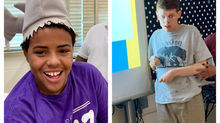Family-School Collaboration: Sharing the vision between educators and families
- Ingrid Ventura Ellis
- Mar 3, 2023
- 3 min read
When I first started my teaching profession, the knowledge and understanding of what it's like to parent a child with disabilities was linked to textbooks and journal articles.

It was ultimately when I started working with these parents as their children’s teacher in their homes that I learned so much from this dynamic.
My personal and professional experience has grown and I have gained so much respect from these relationships.
In this journey, I have seen that there are some situations that can be more draining than others, that could leave parents often confused and stressed.
These situations can exacerbate some emotions and actions in different ways and settings.
The school experience is an example.
“Children’s brains develop best in the context of solid, trusting relationships with parents and caregivers. Since relationships build brains, we must value parents’ influence in their child’s life. That doesn’t necessarily mean agreeing with everything a parent says or granting all they request. It’s more fundamental that parents need to be respected and heard”.
Lucy Ochoa, the founder of Incluyeme (Include Me) an educator and mother of a child with disabilities in Guatemala goes by sharing her own experience:
“As a mother I see MY DAUGHTER AS CAPABLE: My daughter is capable of doing what she wants, my daughter has superior capabilities that other people do not see, she will go far and she will shine”.
Lucy continues by adding the misconceptions and comments from other parents, school officials, and even her own neighborhood really disappointed her, but she was able to transform all that negativity into other positive initiatives.

I knew most schools in Guatemala were not trained and that is why I wrote the book of stories and activities for children to learn about Autism and how to live with it.
My work extended to giving talks every Saturday for almost 18 months where we talked about autism with families and school officials.
Communication, collaboration, and mutual respect between teachers and parents are paramount to student success. There is a need to discover strategies to include parents and build and maintain positive professional relationships with parents of students with disabilities.
In addition, many school meetings address student challenges, but shifting the focus of discussions to the positive shows parents that you know and value the student, and want to help.
Communication for Education teaches educators how to make this shift:
“This is because we’re using a strengths-based model that focuses on what the student CAN do and what they are trying to achieve with support.”
Focusing any plan by stating strengths you've observed in the student and asking the parents to do the same creates an alliance and a mind shift that incites a much more productive and peaceful process.
Alliance Practice
Despite the best intentions, there will be times when teachers and parents disagree. It is important to develop and employ management skills.
Consider the following tips:
Be an active listener.
Don't take things personally or be easily offended. You don't know what else has happened in someone's day before they speak to you.
Take time to breathe and think before responding to a confrontational message; being reactive never helps.
Don't act outside your realm of responsibility. If a parent/teacher asks for a decision that you are not authorized to make, check before responding.
If you anticipate conflict in a meeting, have a third party present. This can help diffuse the situation and provides a witness to any exchange.
Document conflict-related exchanges. Having a record of the exchange can prove important for conflict resolution.
Always keep in mind the ultimate goal: the good of the student.
Looking for our sources?
Check them out here:
Communication for Education, Module 3
Delahooke, M. (2021, September 4). Parents Know Best: Why the Educational System should Stop Marginalizing Parents.
Working & Communicating with Parents of Special Education Students. (2018, July 25). Retrieved from https://study.com/academy/lesson/working-communicating-with-parents-of-special-education-students.html.


























.png)

.png)



.png)


Comments